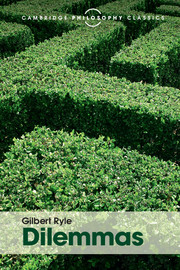Summary
The two specimens of logical litigation that we have so far considered in detail, namely, the fatalist issue and Zeno's issue, have been in a certain way academic dilemmas. We almost deliberately let them worry us just because we found them intellectually interesting. They were, up to a point, like riddles to which we want to get the answers only because getting the answers is good exercise. From now on I want to discuss issues which are more than riddles, issues, namely, which interest us because they worry us; not mere intellectual exercises but live intellectual troubles. There is a further feature of these two issues which will be missing from the ones we shall now be considering. These two issues both come to a sharp edge, indeed a cuttingly sharp edge. Are some things our fault or is nothing our fault? Can some things be averted or can nothing be averted? Does Achilles catch the tortoise at the second milestone or does he go on overtaking him asymptotically through all eternity? But from now on we shall seldom or never be in the simple if uncomfortable position of being pulled just from North and South at once. We shall be in the complex and uncomfortable position of being pulled from a number of directions at the same time.
In this lecture I am going to discuss a small and arbitrary selection of questions about the notion or concept of pleasure. But you will, I hope, realize from the start that these questions will necessarily involve an expanding circle of other concepts. Just as the wicket-keeper cannot keep wicket unless other cricketers perform their cricketing-functions too, so the business of such words as ‘enjoy’, ‘like’ and ‘pleasure’ is ex officio meshed in with the variegated businesses of countless other words.
Although the particular topic that I shall discuss here exemplifies some genuine dilemmas my motive in discussing it is not only to draw attention to further specimens of dilemma. In preparation for some matters that will occupy us later on, I want to show one sort of source from which dilemmas can derive.
- Type
- Chapter
- Information
- DilemmasThe Tarner Lectures 1953, pp. 46 - 57Publisher: Cambridge University PressPrint publication year: 2015
- 2
- Cited by

